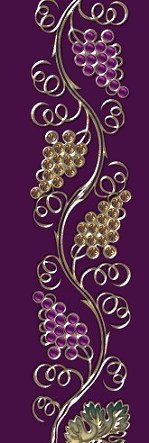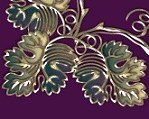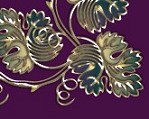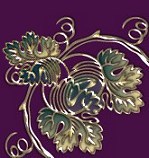
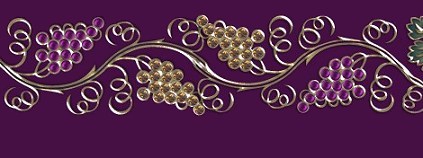
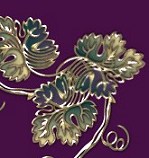
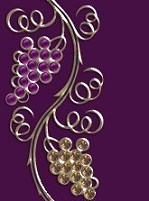











































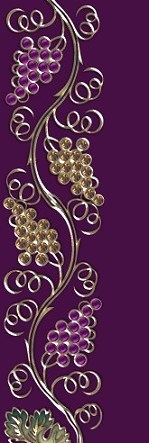

The Lesson of a Vine

By the Rev. Lee Woofenden
Bridgewater, Massachusetts, February 23, 2003
Readings
![]()
Jonah 4 Jonah and the vine
But this was very distressing to Jonah, and he became angry. He prayed to the Lord and said, "O Lord! Is this not what I said while I was still in my own country? That is why I fled to Tarshish at the beginning; for I knew that you are a gracious God and merciful, slow to anger, and abounding in steadfast love, and ready to relent from punishing. And now, O Lord, please take my life from me, for it is better for me to die than to live."
And the Lord said, "Is it right for you to be angry?"
Then Jonah went out of the city and sat down east of the city, and made a shelter for himself there. He sat under it in the shade, waiting to see what would become of the city. The Lord God appointed a vine, and made it come up over Jonah, to give shade over his head, to save him from his discomfort; so Jonah was very happy about the vine. But when dawn came up the next day, God appointed a worm that attacked the vine, so that it withered. When the sun rose, God prepared a scorching east wind, and the sun beat down on the head of Jonah so that he was faint, and asked that he might die. He said, "It is better for me to die than to live."
But God said to Jonah, "Is it right for you to be angry about the vine?"
And he said, "Yes, angry enough to die."
Then the Lord said, "You are concerned about the vine, for which you did not labor and which you did not grow; it was a child of the night and perished in a night. And should I not be concerned about Nineveh, that great city, in which there are more than a hundred twenty thousand people who do not know their right hand from their left, and also many animals?"
Luke 11:29-36 The sign of Jonah and the Ninevites
As the crowds increased, Jesus said, "This is a wicked generation. It asks for a miraculous sign, but none will be given it except the sign of Jonah. For as Jonah was a sign to the Ninevites, so also will the Son of Man be to this generation. The Queen of the South will rise at the judgment with the men of this generation and condemn them; for she came from the ends of the earth to listen to Solomon's wisdom, and now one greater than Solomon is here. The men of Nineveh will stand up at the judgment with this generation and condemn it; for they repented at the preaching of Jonah, and now one greater than Jonah is here.
"No one after lighting a lamp puts it in a hiding place or under a bowl, but on a lamp stand, so that those who come in may see the light. Your eye is the lamp of your body. When your eyes are good, your whole body is also full of light. But when they are bad, your body is also full of darkness. See to it, then, that the light within you is not darkness. Therefore, if your whole body is full of light, and no part of it dark, it will be completely lighted, as when the light of a lamp shines on you."
Apocalypse Explained # 401.36 The meaning of the vine
The vine, which the worm attacked so that it dried up, symbolizes selfish love and the false ideas that come from it--especially the selfishness of not wishing well to anyone but ourselves. The sun that beat down on Jonah's head symbolizes self-love, and the scorching east wind symbolizes the falsity that comes from it. The worm that attacked the vine symbolizes the destruction of this evil and falsity.
 Sermon
Sermon

Then the Lord said, "You are concerned about the vine, for which you did not labor and which you did not grow; it was a child of the night and perished in a night. And should I not be concerned about Nineveh, that great city, in which there are more than a hundred twenty thousand people who do not know their right hand from their left, and also many animals?" (Jonah 4:10, 11)
Noah and the Ark. David and Goliath. Daniel in the Lion's Den, Jonah and the Whale. These and other memorable stories in the Bible read as if they were deliberately constructed to stick in our minds and carry with them a moral and spiritual lesson. And of course, from our perspective, they were deliberately constructed for those purposes--and more. Whether they literally happened as described or not, each carries a clear message, even on the literal level. Noah and the Ark encourages us to follow God's directions, and hold on through our times of struggle. David and Goliath helps us to have courage when we face seemingly insurmountable odds. Daniel in the Lion's Den tells us to be true to our convictions, even when it looks like we will be destroyed as a result, and the Lord will protect us. And Jonah and the Whale (or Big Fish) tells us . . . well, what does the story of Jonah tell us?
The book of Jonah consists of four short chapters. We can easily read the whole thing in five or ten minutes. Here is the gist of it, as expressed by the Rev. Louis G. Hoeck in The Sower Bible Study Notes:
Jonah is commanded to pronounce judgment upon Nineveh for its wickedness. He fears that the Lord will be merciful, and that his message of judgment will be futile, and therefore disobeys the command. He goes down to Joppa, and takes ship for Tarshish, or Tartessus in Spain. A storm overtakes the ship. The sailors cast lots to find out the cause of their misfortune. The lot falls on the unconcerned Jonah. He confesses his disobedience, and counsels the sailors to cast him into the sea. They seek to avoid this, but they are compelled at last to follow his counsel to save themselves. The sea becomes calm. A great fish swallows Jonah. He prays to the Lord, and after three days, the fish casts him forth upon the land. Again the Lord commands Jonah to go to Nineveh. He proceeds thither. The Ninevites repent, and the Lord has mercy on them. Jonah is angry because his mission seems to have failed. He goes outside the city and asks to be allowed to die. The Lord prepares a gourd to protect the prophet from the sun's heat, for which he is very thankful. The gourd perishes the following night. Jonah has pity for it. Yet he has no sympathy for the ignorant living souls in the city.
It is an engaging tale in itself. But it takes on even greater meaning when we realize that Nineveh was the capital city of the Assyrian empire, which eventually conquered the Jonah's nation, the Kingdom of Israel, and carried away as captives its people, who were never heard from again. In other words, Jonah was asked to preach repentance to the mortal enemies of his own nation. This explains why as soon as the command came from the Lord, he got on a ship, intending to go as far as he could in the opposite direction!
Of course, he didn't get away with it. After his famous three days and nights inside the fish, Jonah figured he might as well obey the Lord's command to go and preach repentance to the inhabitants of Nineveh. Much to his dismay and disgust, the Ninevites actually listened to him, and repented in sackcloth and ashes. Still, Jonah hoped against hope that the Lord would carry out his threat anyway, and destroy the city, ridding Israel of its most dangerous enemy. And so he took up his position east of the city to see what would happen.
There he built a shelter to protect himself from the elements. Apparently it wasn't quite sufficient for that purpose, since the Lord helped him by making a vine (traditionally a "gourd") grow up as a shade and a comfort to Jonah. Finally God had done something Jonah liked! But just as fast as the vine grew up, God sent a worm to chew the vine and kill it. And as if that wasn't enough, God also sent a scorching east wind, which, added to the blazing sun, brought Jonah to the brink of heat prostration. Meanwhile, the city of Nineveh just sat there, with no fire and brimstone raining down from heaven to consume it. So much for God doing things that Jonah liked! Jonah was definitely having a bad day.
Well . . . we sometimes have those kinds of days, too. Days when everything seems to go right for the people we think are wrong, and everything goes wrong for us. That's not how it's supposed to work! God is supposed to take care of us and blast our enemies, not the other way around! And when God doesn't do what he's supposed to do, that can make us mighty cranky.
It certainly made Jonah cranky. After all, his people were the chosen people. They were God's own nation, set aside from all the others for God's special care and love. As far as Jonah was concerned, the world revolved around his people, and all other nations were an afterthought, if not an anathema.
In fact, the story of Jonah, like a number of the other prophets, is part of a crucial turning point in the history of the Hebrew people. Throughout most of the historical books in the Old Testament, Israel is portrayed as God's special, chosen people. Other nations are to be avoided or, if they happen to get in the way, subjugated and exterminated. We are good, they are evil. Of course, the Israelites were not unique in this. Most nations had the same belief about themselves--and this continues to be true of many nations today.
However, by the time of the divided kingdom, when many of the prophets were active, that sense of ultimate superiority on the part of the Israelites was beginning to show cracks. First, in the Biblical view, God began to use other nations to punish the Israelites for their violations of his commandments--for their spiritually "adulterous" ways. Instead of always giving Israel the ultimate victory, as God had in the past, God now allowed Israel to suffer defeats from which it never completely recovered. Whole chunks of territory were torn away from the once proud and locally powerful nation, now hopelessly divided into two kingdoms that did not always stick up for each other. Then the threat of total defeat and captivity was first warned of by the prophets, and then actually took place, first in the northern kingdom, by the Assyrians, and then in the southern kingdom, by the Babylonians.
Jonah's story takes place in the context of this gradual slide into corruption and eventual defeat. And as in all such episodes in our lives, the Lord uses our discomfort and anguish as an opening to attempt to reach us with a new and changed view of life, and our place in it. For the Israelites, though they made heroic efforts, it was awfully hard to maintain the idea that they were God's special people, chosen above all others, when they seemed to be continually on the defensive, continually losing ground to other nations. And their prophets began giving them a new message: God is not only with our people; God is also with the other peoples of the world.
This is one of the clear messages in the book of Jonah. When God sent Jonah to prophesy to Nineveh, the capital city of Israel's archenemy, this was a shocking departure from God's usual ways. In the past, the prophets' work had always been with their own people. Maybe they were preaching fire and brimstone to the people, but even that was a sign that God cared enough about his special people to rebuke and chasten them. It was our fire and brimstone! In sending Jonah to rebuke and chasten an enemy of Israel, God was saying, "I care about your enemies just as much as I care about you."
This, Jonah simply couldn't accept. It went against everything he understood about the history of his people and their relationship with God. So he first ran away from the call, and only after being softened up by a hurricane at sea and three days confined inside a fish did he grudgingly go and preach to the people of Nineveh, as commanded.
And the worst thing was that they repented! This meant that God would not destroy them after all--which was the only part of his mission and message that gave Jonah any pleasure. This was the context of our story for today, which is the fourth and final chapter of the book of Jonah.
His job of preaching to Nineveh completed, Jonah went outside the city to see what would happen. There, he built himself a shelter. God made his shelter better by sending a fast-growing vine (or bush) to grow up and provide him shade and comfort. So Jonah sat down in the comfort of his shelter and of the soothing vine, safely isolated from these people whom he hated, but whom he had been all but compelled by God to serve in his role as a prophet. He had done what he was supposed to do, and now it was God's turn.
But God's work in Nineveh was finished for the moment. They had already repented. Now God had a tougher nut to crack: Jonah himself. And since Jonah was not in any state to listen to reason, God instead sent a vine to teach Jonah the lesson he needed. It is a lesson that all the rest of us need as well--especially those of us who consider ourselves, for whatever reason, to be special in God's sight and set apart from others.
The vine grew up quickly and provided Jonah shelter. And Jonah was very happy about the vine. He loved the vine because it served his own comfort. The worm that chewed on the vine, killing it, was an evil thing as far as Jonah was concerned. It destroyed what had given him comfort. And now, with the vine dead, and the blazing sun and scorching east wind assailing Jonah in his own ineffectual shelter, Jonah decided that things were so bad it was time to die. Then came the pointed closing dialog of the chapter:
God said to Jonah, "Is it right for you to be angry about the vine?"
And he said, "Yes, angry enough to die."
Then the Lord said, "You are concerned about the vine, for which you did not labor and which you did not grow; it was a child of the night and perished in a night. And should I not be concerned about Nineveh, that great city, in which there are more than a hundred twenty thousand people who do not know their right hand from their left, and also many animals?"
Jonah never answers God's question. The question is left hanging for him to answer for himself. In fact, it is left hanging for all of humanity, in all following ages, to answer for ourselves. Will we care more about the ephemeral vine that gives us temporary shelter than we do about the masses of humanity, struggling in spiritual darkness, that we have been put here on earth to serve?
Both the shelter that Jonah built and the vine that God sent are pictures of Jonah's self-satisfaction in his own righteousness. It is easy for us to be self-righteous as well. After all, we know the truth, and they do not. We are enlightened; they are ignorant--and probably evil. Especially if they have said or done things that have hurt us, making them our enemies. When we are in that frame of mind, in our self-absorption we develop justifications for doing nothing for all those people whom we inwardly despise, but who so greatly need our help. Even religious justifications. "They're reaping what they have sown," we may tell ourselves. "It's their own fault. Why should I help them? Am I my brother's keeper?"
Though we may not admit it even to ourselves, just as Jonah never explicitly invoked God's wrath and destruction on the Ninevites, we secretly hope that those bad people will get their comeuppance--that they will suffer for their evils and for their ignorance. This is when we ourselves sorely need a lesson in the greatness of God's love and compassion. The blazing sun and scorching east wind picture Jonah's own resistance to God's universal love. God's love seems wrong to us when it extends to those people that we think God should be busy destroying.
But that is not God's way. God's way is to love all people, both the "good" and the "bad." In the words of Jesus, "He causes his sun to rise on the evil and the good, and sends rain on the righteous and the unrighteous" (Matthew 5:45). And now God is asking us: Will we hide away in our shelter of self-righteousness? Or will we put our light on a lamp stand for all to see--both the people we love and care for and the people we feel we have reason to despise and avoid? Once again, Jesus said:
No one after lighting a lamp puts it in a hiding place or under a bowl, but on a lamp stand, so that those who come in may see the light. Your eye is the lamp of your body. When your eyes are good, your whole body is also full of light. But when they are bad, your body is also full of darkness. See to it, then, that the light within you is not darkness. Therefore, if your whole body is full of light, and no part of it dark, it will be completely lighted, as when the light of a lamp shines on you.
Amen.
|
|
|
|
|
|
||
Music: Forever and a Day
© 1999 Bruce De Boer

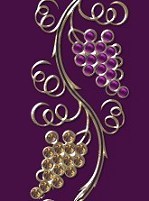































 |
|










